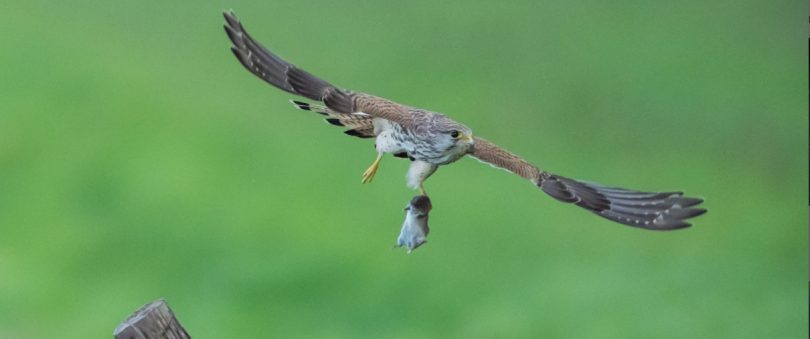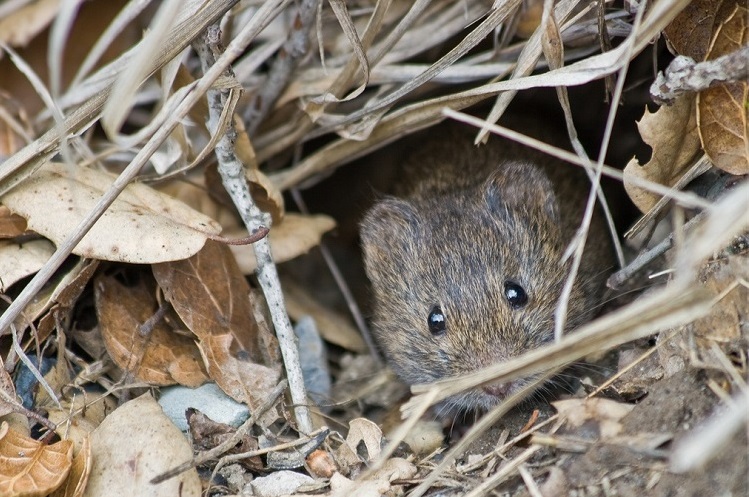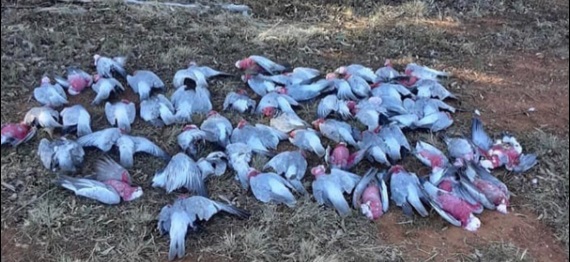
The recent cold snap has done little to abate the current mouse plague gripping rural NSW. Photo: Supplied.
Out in the land of crops west and north of Canberra, the cold isn’t doing much to abate the plague of mice across grain-germinating paddocks.
Farm folklore dictates that the first frosts would decimate populations, but recent rain, snow and bitter winds are proving as ineffective as Queensland was against NSW in game one of the 2021 State of Origin series as poisonous pressures mount.
Canberra-based CSIRO research scientist Dr Peter Brown says despite harsh conditions, mice can be very comfortable within their burrows.
“They are protected from extreme temperatures,” he said. “They have nesting material in their burrows and while they might get cold while foraging for food, they’re then nice and comfortable in their burrows.”
He says it’s not the cold that finishes off mice.
“It is more likely to be a combination of lack of food, high population densities, diseases going through the population, and overall poor health meaning that the cool or wet weather exacerbates these things,” said Dr Brown.
In light of this, the NSW Government is rolling out a mice control support program to help farmers, small businesses and households manage the high levels of mouse activity across the state, and this week announced an additional $100 million of its mouse plague assistance package.
Farmers will now be eligible for a 50 per cent rebate, up to $10,000, for zinc phosphide bait under the program.
NSW Department of Primary Industries (NSWDPI) successfully applied to the Australian Pesticides and Veterinary Medicines Authority (APVMA) to allow the use of double strength zinc phosphide bait on bare fallows prior to the 2021 sowing period.

The recent cold snap did little to diminish populations of mice which are making use of good natural stores of feed and shelter to survive. Photo: Supplied.
The permit allows for bait to be applied late in the afternoon to maximise consumption by mice, which generally feed at night, and is in effect until August 2022.
NSW Farmers vice president Xavier Martin said this is an important step in helping farmers manage the costs associated with this major plague.
“The practical support measure of rebates for zinc phosphide was an initiative from NSW Farmers and we thank our many members for sharing their stories of the widespread impact of this plague,” he said.
“It’s common sense to support the use of an immediately available chemical which carries fewer secondary poisoning and environmental risks than alternatives [do].”
The approval requires users of zinc phosphide to report any bird kill incident following application of the bait to fallow land to either NSWDPI or NSW Environment Protection Authority (NSWEPA).
The NSW Government is also seeking emergency approval from the APVMA for the use of bromadiolone to control mice in NSW, through treated grain around crop perimeters.
Twenty locations across regional and rural NSW have been identified for bromadiolone grain treatment sites and the NSW Minister for Agriculture’s office says around 600 farmers have registered to use the product.
But Dr Maggie Watson, an ecologist at Charles Sturt University’s Institute for Land, Water and Society in Albury-Wodonga, said the risk of using bromadiolone is just not worth it.
“We know through bromadiolone use in other countries such as Russia and Mongolia that the secondary poisoning risk is immense,” she said. “Bromadiolone can take up to 19 days to work in mice so the effects are not instant.”

The NSW Environment Protection Authority is aware of a number of reports of bird deaths around Forbes, Parkes, Dubbo, Narromine, Condobolin and the Riverina that may be related to mouse baiting. Photo: Facebook.
Dr Watson said bromadiolone stays active up to 130 days in the livers of animals that eat it and spreads throughout the food chain, affecting not only the mice that eat the bait, but birds, reptiles and insects.
This chemical is highly persistent and runs the very real risk of poisoning many other animals that either eat the bait or eat animals that have eaten the bait, including birds of prey, reptiles, working dogs and sheep, she explained.
“The secondary poisoning risk is simply not worth it when first-generation anticoagulants work just as fast and just as effectively and the NSW government already has a permit for double strength zinc phosphide,” she said.
Dr Watson was unable to confirm if recent large-scale bird deaths were related to ingestion of zinc phosphide-treated grain.
“It is quite possible that the recent galah and magpie deaths are due to zinc phosphide, but we are awaiting toxicology results before saying anything,” she said. “It could simply be fungicide or some other chemical; it’s too early to tell.”
The NSWEPA told Region Media it is aware of a number of reports of bird deaths around Forbes, Parkes, Dubbo, Narromine, Condobolin and the Riverina that may be related to mouse baiting.
“Grain eating birds can be affected if they eat pesticide-coated grain, and the EPA is investigating all reports of animal deaths related to intentional misuse of pesticides, which includes collecting dead animals for examination and testing where possible,” said the NSWEPA.
“The EPA will continue to take reports and monitor the use of pesticide to minimise unintended impacts on wildlife.”
The NSWEPA has reminded the community to avoid handling sick and dying animals which can carry disease as well as pesticide residue.
Landcare NSW, Local Land Services and Grain Producers Australia were contacted for comment but none was forthcoming.
Dr Watson says the APVMA is currently asking Australians for their views on how rodent poisons are regulated and has suggested that people wishing to have a say do so through a submission here.






